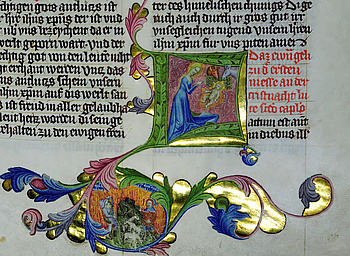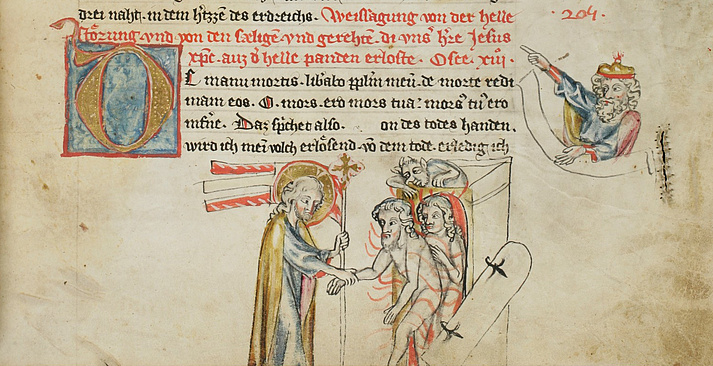Who was the Austrian Bible Translator?

During the 1930s, first and still rather vague correlations of a large bible opus in the German language were discovered. Since his name was mentioned in one of the manuscripts, the famous poet Heinrich von Mügeln was initially assumed to be the author. By now, this thesis has been disproved for chronological and textual reasons alike.
So for the time being, in the field of research the anonymous author of this comprehensive work is known as the Austrian Bible Translator. His name is derived from the assumed area of his activity, the medieval Duchy of Austria, situated on the border between the dioceses of Salzburg and Passau, where most of the manuscripts were found and where the anonymous did most of his work, translating large parts of the Holy Scripture into the German language.
Translations, Commentaries and Treatises in German Language
In addition to his translations of large parts of the Old and the New Testament during the first half of the 14th century, this Austrian Bible Translator also authored comprehensive Psalm Commentaries as well as other texts such as treatises against heretics and against Jews. He seemingly devoted all his work to the task of achieving a German-language Bible for the laity. His commentaries and interpretations are always directed at this audience.
The Bible Translator considers himself a layman. For the time being it cannot be ascertained whether he refers to the world’s laity, which is probably the case, or whether he refers to a lay brother in a particular monastery. His translations were not at all lay work though, but linguistically quite elaborate, testifying to a comprehensive knowledge and an excellent understanding of the Latin language.
Making the Holy Scripture More Accessible for the Faithful

The author’s layman status also exposed his translation of the Holy Scripture to vehement hostilities, which he confidently stood up to, especially in the prefaces to his Old Testament Work and in individual biblical books. In these prefaces, for example in his preamble to the Psalm Commentaries, he even explicitly promotes the translation of the Holy Scripture into the German language, in order to make it more easily available for the faithful.
Still, the bible translator not only emphasizes the importance of a translation, he also points out the need of providing the texts selected for laypersons with an interpretation (bedeutnus), an accompanying glossary explaining and annotating the text. In doing so, the Anonymous relies on being inspired by the Holy Spirit but also on the support and advice of well educated people (wol gelerter leut hilf und rat). Besides the popular Glossa ordinaria, medieval standard reference for the exegesis and commentaries on the biblical story, he also consults the contemporary Latin postil on the Psalms by Franciscan Nikolaus von Lyra while it was still being written.
References to Powerful and Affluent Benefactors
As of today there is still little known about the Anonymous industriously translating the books of the Bible, but there is quite some evidence that he had wealthy and powerful benefactors. Among the Gospel Work manuscripts there are quite splendid and precious ones, their rich decor implying influential and affluent clients. Yet the importance of his work for understanding pre-Reformation, German-language Bible translations has been recognized. These findings as well as numerous indications of the Austrian Bible Translator’s influence on the literary history of Austria, Bavaria and the Central German area as well as on the entire Late Middle Ages in this region, encourage further research.
